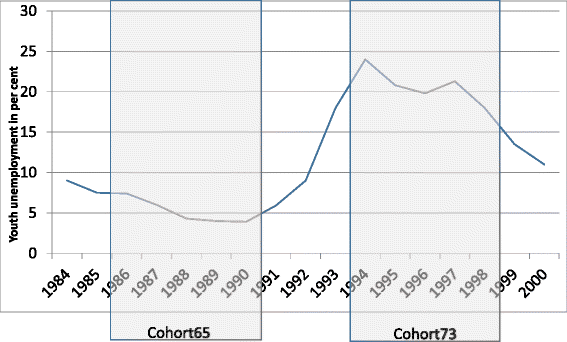Children of boom and recession and the scars to the mental health--a comparative study on the long term effects of youth unemployment
- PMID: 26792092
- PMCID: PMC4720998
- DOI: 10.1186/s12939-016-0305-0
Children of boom and recession and the scars to the mental health--a comparative study on the long term effects of youth unemployment
Abstract
Background: Earlier research shows that there is an association between unemployment and poor mental health, and that recovery from the damages to mental health obtained during unemployment remains incomplete over a long period of time. The present study relates this 'mental health scarring' to the trade cycle, exploring if those exposed to youth unemployment during boom differ from those exposed during recession with respect to mental health in the middle age.
Methods: The sample consists of two cohorts from the same industrial town in Northern Sweden: the cohort born in 1965 and the cohort born in 1973 included all pupils attending the last grade of compulsory school, respectively, in 1981 and in 1989. Their depressiveness and anxiousness were assessed by questionnaires at age 21 and again at age 43/39. Mental health at follow-up was related to exposure to unemployment during age years 21-25. Statistical significance of the cohort*exposure interactions from binary logistic regression analyses were used to assess the cohort differences in the mental health between Cohort65 and Cohort73, entering the labour market, respectively, during a boom and a recession.
Results: Compared to the unexposed, high exposure to unemployment at the age from 21 to 25 was associated to increased probability of poor mental health in the middle age in both in Cohort65 (odds ratio 2.19 [1.46-3.30] for anxiousness and 1.85 [1.25-2.74]for depressiveness) and in Cohort73 (odds ratio 2.13 [1.33-3.39] for anxiousness and 1.38 [0.89-2.14] for depressiveness). The differences between the cohorts also turned out as statistically non-significant.
Conclusions: The scars of unemployment exposure onto future health seem to be rather insensitive to economic trades. Thus, at the population level this would mean that the long-term health costs that can be attributed to youth unemployment are more widespread in the generation that suffers of recession around the entry to the work life.
Figures
Similar articles
-
How do labour market conditions explain the development of mental health over the life-course? a conceptual integration of the ecological model with life-course epidemiology in an integrative review of results from the Northern Swedish Cohort.BMC Public Health. 2024 May 15;24(1):1315. doi: 10.1186/s12889-024-18461-6. BMC Public Health. 2024. PMID: 38750531 Free PMC article. Review.
-
Do open youth unemployment and youth programs leave the same mental health scars?--Evidence from a Swedish 27-year cohort study.BMC Public Health. 2015 Nov 20;15:1151. doi: 10.1186/s12889-015-2496-5. BMC Public Health. 2015. PMID: 26589399 Free PMC article.
-
Long-term effects of youth unemployment on mental health: does an economic crisis make a difference?J Epidemiol Community Health. 2017 Apr;71(4):344-349. doi: 10.1136/jech-2016-208012. Epub 2017 Jan 13. J Epidemiol Community Health. 2017. PMID: 28087812 Free PMC article.
-
The great recession, youth unemployment and inequalities in psychological health complaints in adolescents: a multilevel study in 31 countries.Int J Public Health. 2016 Sep;61(7):809-19. doi: 10.1007/s00038-016-0866-0. Epub 2016 Aug 8. Int J Public Health. 2016. PMID: 27502510
-
Economic recession and suicidal behaviour: Possible mechanisms and ameliorating factors.Int J Soc Psychiatry. 2015 Feb;61(1):73-81. doi: 10.1177/0020764014536545. Epub 2014 Jun 4. Int J Soc Psychiatry. 2015. PMID: 24903684 Review.
Cited by
-
Why does youth unemployment lead to scarring of depressive symptoms in adulthood? The importance of early adulthood drinking.Scand J Public Health. 2024 Dec;52(8):960-967. doi: 10.1177/14034948231208472. Epub 2023 Dec 28. Scand J Public Health. 2024. PMID: 38153038 Free PMC article.
-
A rapid review investigating the potential impact of a pandemic on the mental health of young people aged 12-25 years.Ir J Psychol Med. 2021 Sep;38(3):192-207. doi: 10.1017/ipm.2020.106. Epub 2020 Sep 11. Ir J Psychol Med. 2021. PMID: 32912358 Free PMC article. Review.
-
The Impact of Economic Recessions on Depression, Anxiety, and Trauma-Related Disorders and Illness Outcomes-A Scoping Review.Behav Sci (Basel). 2021 Aug 31;11(9):119. doi: 10.3390/bs11090119. Behav Sci (Basel). 2021. PMID: 34562956 Free PMC article.
-
Living in the shadow of unemployment -an unhealthy life situation: a qualitative study of young people from leaving school until early adult life.BMC Public Health. 2019 Dec 10;19(1):1661. doi: 10.1186/s12889-019-8005-5. BMC Public Health. 2019. PMID: 31823760 Free PMC article.
-
Youth mental health in the time of COVID-19.Ir J Psychol Med. 2020 Dec;37(4):301-305. doi: 10.1017/ipm.2020.84. Epub 2020 Jul 2. Ir J Psychol Med. 2020. PMID: 32611470 Free PMC article.
References
-
- Elder GH. Children of the great depression: social change in life experience. Chicago: Univ. of Calif. P; 1974.
-
- Kahn L. The long-term labor market consequences of graduating from college in a bad economy. Labour Econ. 2010;17:303–316. doi: 10.1016/j.labeco.2009.09.002. - DOI
-
- Hershbein B. Graduating high school in a recession: work, education, and home production. B.E. J Econ Anal Policy. 2012;12 (DOI: http://dx.doi.org/10.1515/1935-1682.2599). Accessed 19 Jan 2016 - DOI - PMC - PubMed
-
- DiPrete T. Life course risks, mobility regimes, and mobility consequences: a comparison of Sweden, Germany, and the United States. Am J Sociol. 2002;108:267–309. doi: 10.1086/344811. - DOI
Publication types
MeSH terms
LinkOut - more resources
Full Text Sources
Other Literature Sources
Medical


